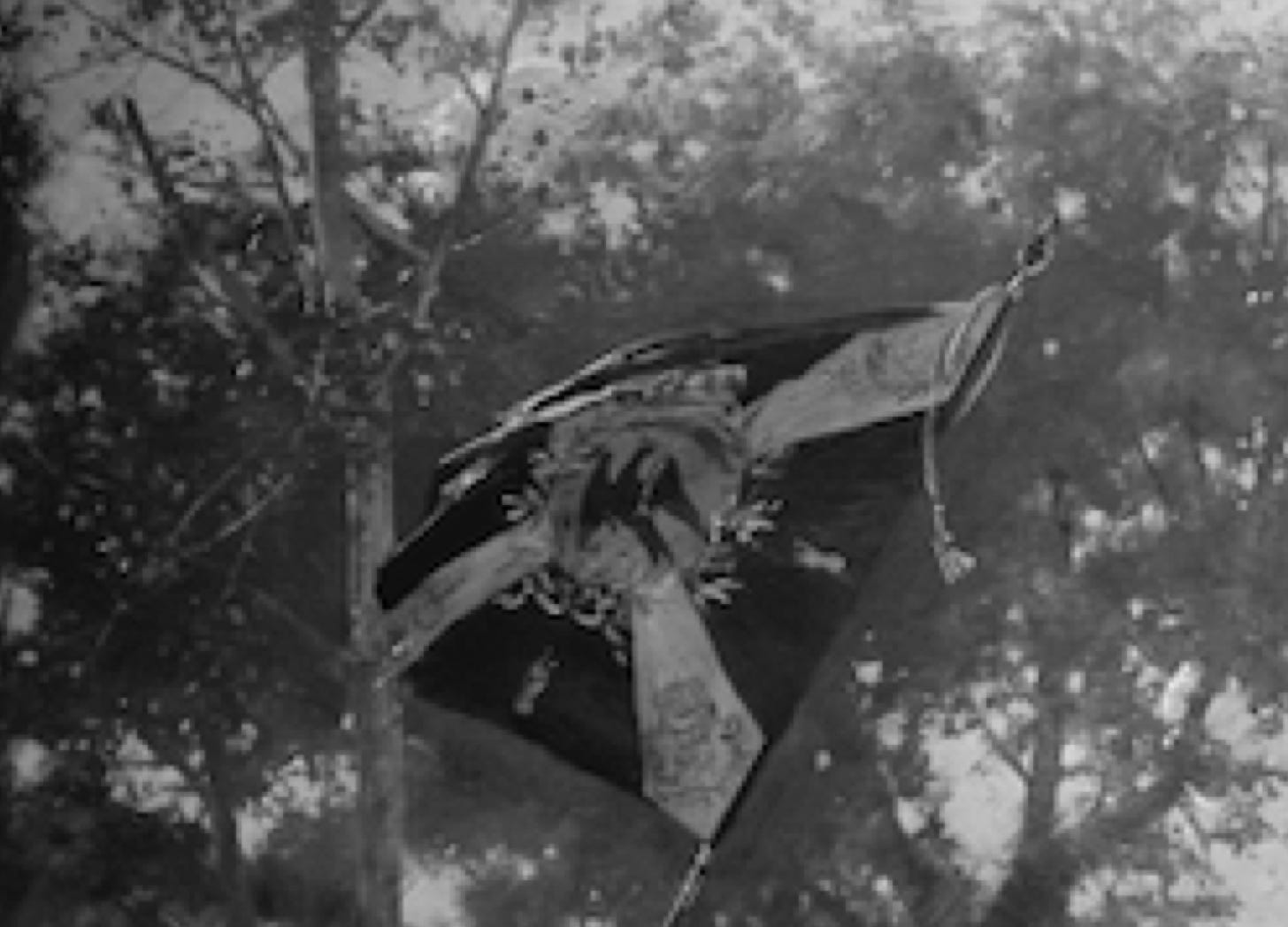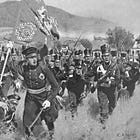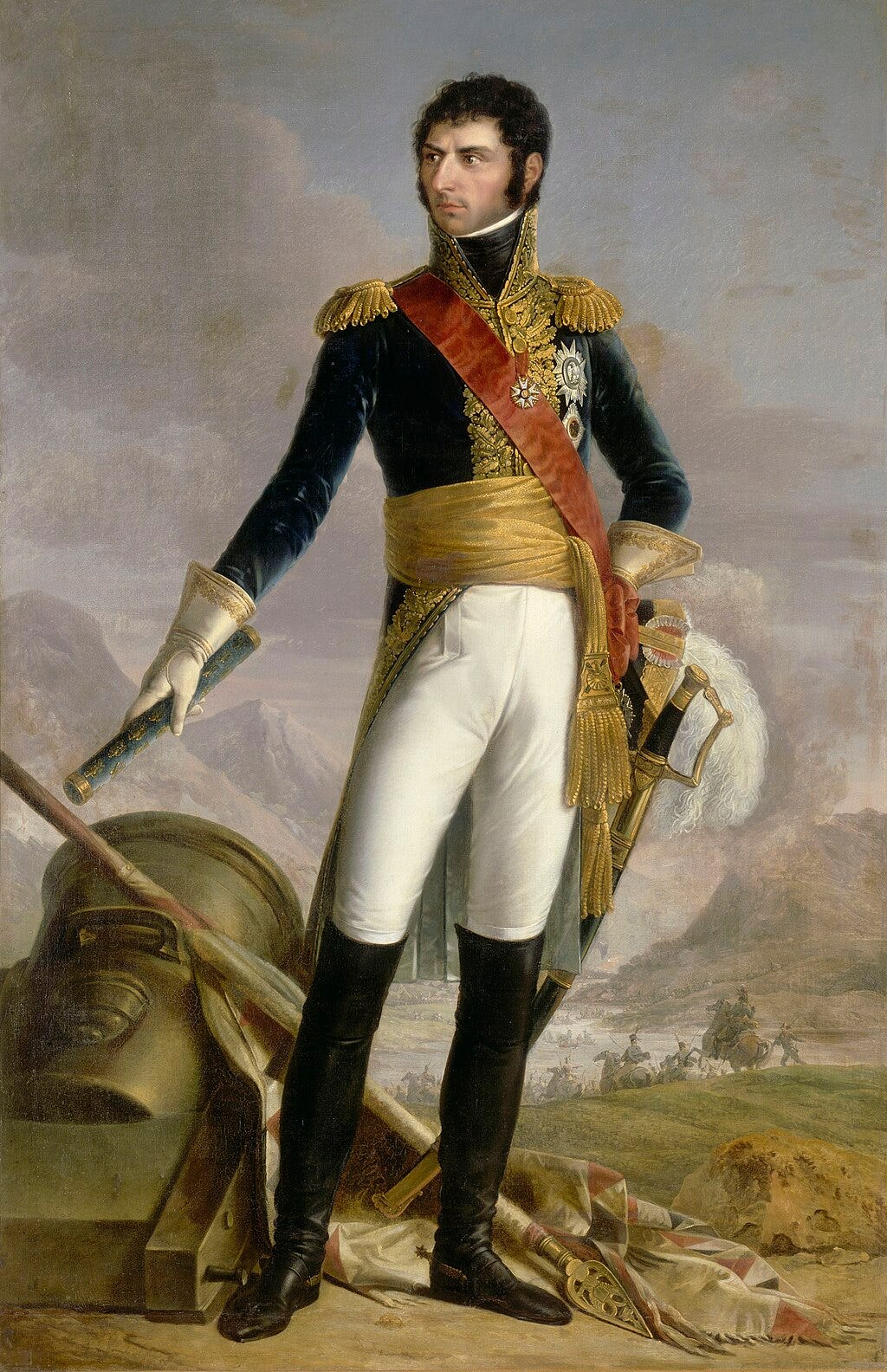This is the fourteenth post in a multi-part series. To find previous installments and those that follow, please consult the following guide.
‘The color - the color!’ cried the wretched fugitives with wide opened eyes to their advancing comrades. Many of them wanted to join on the new advance, but were roughly motioned back. ‘Rally in the rear. There is no room for you here.’ Even at such moments no mixing or crowds were to be tolerated.
When the front was fairly clear, the firing line found itself about 100 yards from the spot where the color was supposed to be. The enemy was not much farther than our own men from the same place. He, cheering, for there was a color to be won, was advancing in extended order with a few bodies of troops in close order.
At such a murderously close distance it was all important to be the first to open fire. ‘Halt, and fire!’ shouted our battalion commander, who was riding close behind the firing line.
The command ‘Down!’ followed, and then five almost simultaneous volleys crashed out against the enemy. Their effect was instantaneous. In a twinkling, the enemy’s attacking force disappeared and dissolved in a thick cloud of smoke. The successive bursts of this fire mowed clear vistas in the enemy’s ranks.
In some places we saw his skirmishers rushing back to seek cover in the dips of the ground. The antagonist was stubborn, and kept on deploying fresh forces to fill up the gaps.
Our support continued their advance, part of them reinforcing the center, part prolonging the firing line to the left. Protected by the terrific volleys of some 800 rifles, the 3rd Battalion, advancing by rushes, crushed back the right wing of the enemy, and aligned itself with the 2nd Battalion. In consequence of the extension of the enemy’s line, this battalion also had been obliged to prolong its own firing line to an extent that only left a few platoons in support.
In this manner, by using up all our strength, we succeeded in staying for a time this dangerous counter attack. But the color of the unlucky 1st Battalion, a tempting trophy, still lay in front of the enemy’s line.
What a difference there was between the antagonists! On the enemy’s side frequent movements, a good deal of uneasiness, rushing forward, ebbing back, shoving aside; on our side the immovable firmness of close ordered lines, lying as if pinned to the ground. There, confusion and crowding, different detachments rushing together or flying apart and preventing each other from firing. Here, order and command. There a monotonous, unceasing fire; here an impressive and aggressive fire, frequently interrupted, sometimes silent along the whole line, only to break out again with greater violence. The shock which such an outbreak of fire, after a short silence, caused to the enemy’s firing line was most marked.
Still more apparent was the effect when such an outbreak was caused by movements of the enemy , or by the appearance of dark masses in rear of the smoke of his firing line. This fire was volcanic in its fierceness. Frederick’s opponents described the effect of his infantry fire to be as if hell had opened its jaws.
I looked about for the fragments of the 1st Battalion. Its closing officer had de- posited the reserve ammunition, under cover, at a spot about 450 yards behind the firing line, and here, by his orders, the battle-police directed the fugitives.
About 200 men had now rallied at this point, and had re-filled their ammunition pouches. The few officers among them were nearly all more or less wounded. There was but one senior officer, a captain. Round about this little troop were resting many wounded and exhausted men, whose most necessary wants were being attended to by the stretcher bearers and ambulance men. The groans of the wounded suited well with the downcast looks of the untouched men.
The Colonel now galloped up with his adjutant. The men eyed him with doubt and fear. You could read in every eye the bitter thought, ‘He will ask us, “Where is the color?”’
‘You fought well, men,’ said the Colonel, dismounting. ‘The enemy was too strong for you, but the battalion did its duty. Your color is not lost yet. It lies a hundred paces in front of the 2nd Battalion. With it lies your brave commander and most of your officers.’
The old Captain cried like a child.
‘There is still time,’ said the Colonel. ‘Which of you will go with me and regain the color?’
The officers stepped forward.
‘Not a man of the 4th Company will stay behind,’ said the Captain, looking into his men’s eyes.
‘We’ll go too!’ shouted others.
Many men stepped forward quietly and sloped arms.
‘We’ll all go!’ shouted a gigantic soldier, who had lost his helmet, his face covered with blood, and his forehead bound up with a white cloth. ‘The man who won’t go, doesn’t know what honor is.’
All had stepped forward. An officer with a shattered right arm held his sword in his left hand. Even some of the slightly wounded and exhausted men wanted to fall in, but were not allowed.
The closing officer begged that he and his men might go.
‘It concerns your color,’ cried the Colonel, ‘and in such a matter I will keep no one back. Take off your gorgets, and arm yourselves.’
Each company formed a platoon. They fell in, in single rank, with fixed bayonets. Two drummers beat the charge.
‘Close up,’ admonished the Colonel, ‘and not a halt until we reach the color.’
The regimental adjutant hurried on before to warn the 2nd Battalion of the unexpected reinforcement. As soon as the first whistle of the forlorn hope was heard by the front line it burst into a hellish magazine quick fire, before which the reinforcements of the enemy’s firing line crumbled away.
With the second whistle the Colonel shouted ‘Double!’ cheered, and rushed forward towards the spot where the color must be lying. The firing line threw up their muzzles in the air. On rushed the 1st Battalion behind the Colonel, passing over the firing line of the 2nd Battalion.
No sooner did these last recognize the regimental chief than up sprang its shattered ranks, and went in pursuit of the 1st Battalion. Cheering wildly, and accompanied by the volleys of the 3rd Battalion, the entire left wing swept forward at the charge. The enemy fled.
My heart beats fast. They reach the spot where the bodies lie thickest. They bestride it. They search it. Loud shouts of triumph announce success. The old symbol of victory is raised again from the dust of its passing defeat. The soldier with the white bandaged head carries the color to the Colonel. This officer grasps it, kisses it, and waves it triumphantly over his head. The numerous ribbons, the mementoes of a famous past, flutter in the breeze.
For a moment the thoughts of all in the 1st Battalion are centered on the color. They even forget the enemy. Helmets are waved. They point at the color and yell. They break into tears. Then all grasp their rifles, and from the same spot which we had been forced to leave with such severe loss, repay to the flying foe, with heavy interest, the debt of blood.
‘Brave regiment and brave Colonel,’ I exclaimed. ‘And as for you, battalion, now joyously submitting to immolation, there are not many left of you. But in the times hereafter there will be thousands upon thousands whose blood will be kindled of the story of the seven hundred of your sons who are now bleeding and dying on the field, thousands upon thousands whose enthusiasm will be roused when they hear of your deeds and the glorious history of your color.’
Was that not a white livered time when the colors remained behind troops going into action? When they were hidden in some forsaken corner of the battlefield, under the escort of a sergeant and some privates, till the battle was over; or, if reports do not lie were, on the eve of a fight, even ordered to be kept with the baggage? What will future generations say of an age in which the colors marched proudly in front on parade, but during an action skulked away.
Was not Bernadotte, whose boast it was never to have lost a gun, notoriously a general who never committed himself seriously? When any beaten army finds comfort in having lost neither colors nor guns, you may generally offer it the cold consolation that had the guns run the risk of capture and the colors been in front of the regiment, it would probably not have been beaten.
To a brave corps the color means ‘death or victory’. No fear of disgrace being attached to such a color, if, after a desperate battle, it does fall into the enemy’s hands. If, however, some daring squadron of the enemy should capture colors hidden away behind the battlefield, or even with the baggage, then the most heroic deeds in battle cannot wipe away such a slur.
To be continued …
Soon after an installment of this series is posted to The Tactical Notebook, a link to it will appear on the following guide.







